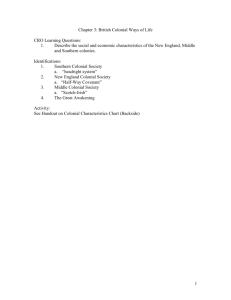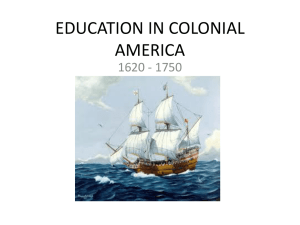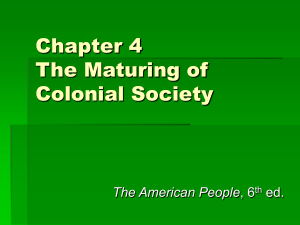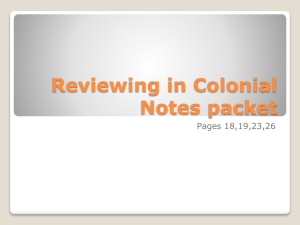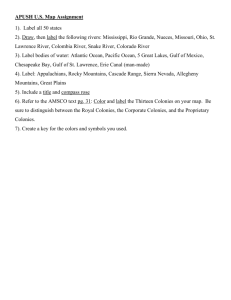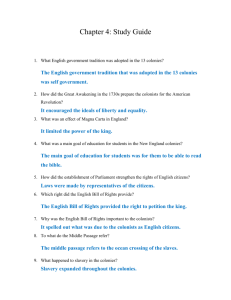The Planting of English America, 1500 – 1733
advertisement
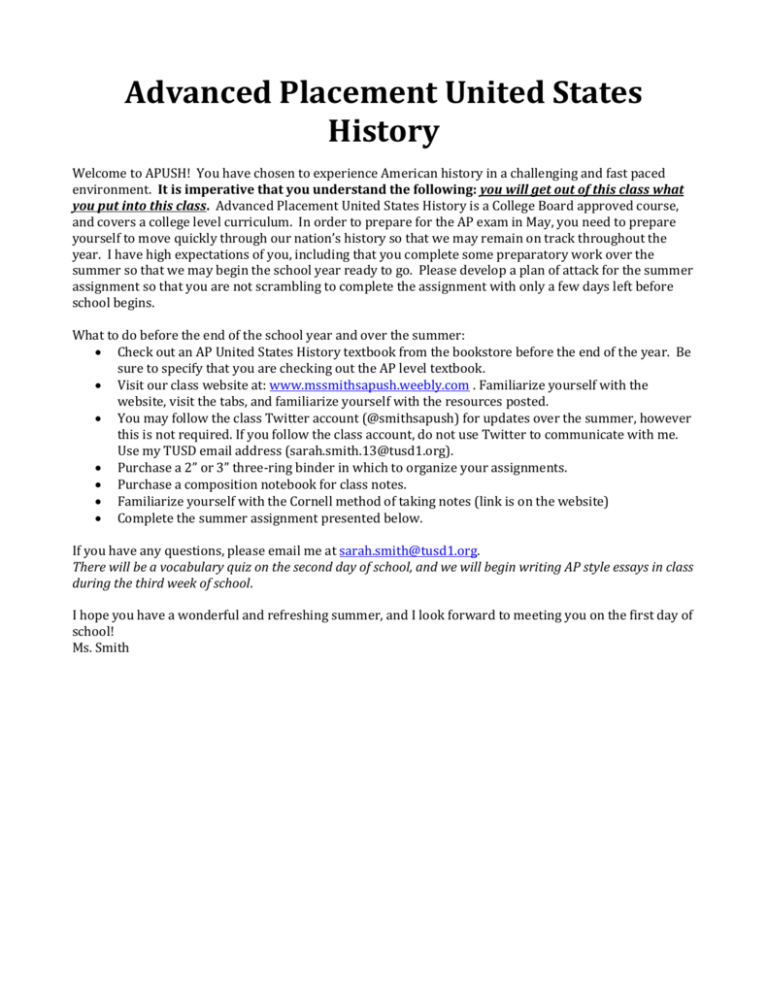
Advanced Placement United States History Welcome to APUSH! You have chosen to experience American history in a challenging and fast paced environment. It is imperative that you understand the following: you will get out of this class what you put into this class. Advanced Placement United States History is a College Board approved course, and covers a college level curriculum. In order to prepare for the AP exam in May, you need to prepare yourself to move quickly through our nation’s history so that we may remain on track throughout the year. I have high expectations of you, including that you complete some preparatory work over the summer so that we may begin the school year ready to go. Please develop a plan of attack for the summer assignment so that you are not scrambling to complete the assignment with only a few days left before school begins. What to do before the end of the school year and over the summer: Check out an AP United States History textbook from the bookstore before the end of the year. Be sure to specify that you are checking out the AP level textbook. Visit our class website at: www.mssmithsapush.weebly.com . Familiarize yourself with the website, visit the tabs, and familiarize yourself with the resources posted. You may follow the class Twitter account (@smithsapush) for updates over the summer, however this is not required. If you follow the class account, do not use Twitter to communicate with me. Use my TUSD email address (sarah.smith.13@tusd1.org). Purchase a 2” or 3” three-ring binder in which to organize your assignments. Purchase a composition notebook for class notes. Familiarize yourself with the Cornell method of taking notes (link is on the website) Complete the summer assignment presented below. If you have any questions, please email me at sarah.smith@tusd1.org. There will be a vocabulary quiz on the second day of school, and we will begin writing AP style essays in class during the third week of school. I hope you have a wonderful and refreshing summer, and I look forward to meeting you on the first day of school! Ms. Smith Summer Assignment This assignment needs to be completed over summer break and is due by the first day of school. Your assignment over the summer is to read Chapters One through Four (in the new textbook, The Enduring Vision), or Chapters One through Four (in the old textbook, America Past and Present) and answer the following questions. Your responses need to be typed, and they need to be completed in the order in which the questions appear. Please see the “Instructions for submission” below. Each response needs to be answered in a minimum of one paragraph of at least seven sentences. As you read, you should take notes from each chapter. I recommend using the Cornell method (see website for example). Additionally, you need to identify and define the attached vocabulary terms for each of these chapters in at least 3 sentences for each term. As you define the terms consider why the event/idea/person is significant enough to be on our vocabulary list. Number each vocabulary term, single space the definition and then double space between each term. This is an individual assignment! Duplicate assignments will be considered plagiarism and will be given a score of zero. Instructions for submission You will submit your question responses and vocabulary terms using turnitin.com. You will need to create an account for turnitin.com by going to the website and following instructions. This website is only used for turning in written work, and checks for plagiarism. Any work containing more than 10% plagiarized material will be given a score of zero. Please email me with concerns. Create two separate files to be turned in, one with your vocab and one with your written responses. There are two assignments in Turnitin.com, please make sure you are uploading the correct work to the correct assignment. The class ID is 9878510 and the enrollment password is sabino2015. You will need this information to join the class. Submit your assignments through the site any time over the summer, but no later than 8am on the first day of school, Thursday, August 6. The Planting of English America, 1500 – 1733 Theme: After a late start, a proud, nationalistic England joined the colonial race and successfully established five colonies along the southeastern seacoast of North America. Although varying somewhat in origins and character, all these colonies exhibited plantation agriculture, indentured and slave labor, a tendency toward strong economic and social hierarchies, and a pattern of widely scattered, institutionally weak settlement. Theme: The early southern colonies’ encounters with Indians and African slaves established the patterns of race relations that would shape the North American experience – in particular, warfare and reservations for the Indians and lifelong slave codes for African-Americans. Questions: 1. What did England and the English settlers really want from colonization? National glory? Wealth? Adventure? A solution to social tensions? New sources of goods and trade? Did they get what they wanted? 2. Were the English colonizers crueler or more tolerant than the Spanish conquistadores? Why did the Spanish tend to settle and intermarry with the Native American population, whereas the English did not? 3. Was the development of African slavery in the North American colonies inevitable? (Consider that it never developed in some other colonial areas, for example, Mexico and New France.) How would the North American colonies have been different without slavery? Settling the Northern Colonies, 1619 – 1700 Theme: The Protestant Reformation, in its English Calvinist (Reformed) version, provided the impetus for the settlement of New England. The New England colonies developed a fairly homogeneous social order based on religion and semi-communal family and town settlements. Theme: The middle colonies developed with far greater political, ethnic, religious, and social diversity, and represented a more cosmopolitan middle ground between the tightly knit New England towns and the scattered, hierarchical plantation south. Questions: 1. Did the Puritans really come to America seeking religious freedom? How did they reconcile their own religious dissent from the Church of England with their persecution of dissenters like Hutchinson and Williams? Does their outlook make them hypocrites? 2. How does the founding of the New England colonies compare with the origin of the middle colonies? In what ways were New England and the middle colonies each like the South, and in what ways were they different? American Life in the Seventeenth Century, 1607 – 1692 Theme: In the Chesapeake region, seventeenth-century colonial society was characterized by diseaseshortened lives, weak family life, and a social hierarchy that included hardworking planters at the top and restless poor whites and black slaves at the bottom. Theme: By contrast, early New England life was characterized by healthy, extended life spans, strong family life, closely knit towns and churches, and a demanding economic and moral environment. Questions: 1. Why did slavery grow to be such an important institution in colonial America? What were the effects of slavery on the Africans who were brought to the New World? 2. What was attractive and unattractive about the closely knit New England way of life? 3. Were the Salem witch trials a peculiar, aberrant moment in an age of superstition, or did they reflect common human psychological and social anxieties that could appear in any age? How harshly should those who prosecuted the “witches” be condemned? Colonial Society on the Eve of Revolution, 1700 – 1775 Theme: Compared with its seventeenth-century counterpart, eighteenth-century colonial society became more complex and hierarchical, more ethnically and religiously diverse, and more economically and politically developed. Theme: Colonial culture, while still limited, took on distinct American qualities in such areas as evangelical religion, education, press freedom, and self-government. Questions: 1. How democratic was colonial American society? Why was it apparently becoming less equal? 2. What were the causes and effects of the Great Awakening? How did such an intense religious revival affect those who experienced “conversion” as well as those who did not? How did the Awakening help to create a sense of shared American identity? Each term on this page must be defined in at least two sentences. Do not copy the first two sentences from Wikipedia (or whatever website you reference). Make the definitions meaningful to you. Political/Economic Theory Vocabulary Mercantilism Capitalism Socialism Communism Nationalism Fascism Imperialism Liberalism Deterrence Theory Balance of Power Theory Nation-State Nongovernmental Organizations (NGOs) Hegemonic Stability Theory Collective Defense Theory International Political Economy (AKA – Global Political Economy) Exploration and Colonization (1492-1763) Virginia Company Virginia House of Burgesses William Bradford Mayflower Compact John Winthrop “City on a Hill” Salem Witch Trials Roger Williams Pequot War King Phillip’s War Bacon’s Rebellion New Amsterdam Society of Friends Maryland Toleration Act (1649) Fundamental Orders of Connecticut (1639) Restoration Colonies Dominion of New England John Peter Zenger Jonathan Edwards George Whitefield Albany Plan of Union Benjamin Franklin Great Awakening Half-Way Covenant Headright System Indentured Servants Middle Passage Separatists Triangular Trade John Rolfe




